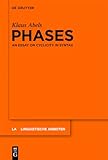Phases : An essay on cyclicity in syntax / Klaus Abels.
Material type: TextSeries: Linguistische Arbeiten ; 543Publisher: Berlin ; Boston : De Gruyter, [2012]Copyright date: ©2012Description: 1 online resource (323 p.)Content type:
TextSeries: Linguistische Arbeiten ; 543Publisher: Berlin ; Boston : De Gruyter, [2012]Copyright date: ©2012Description: 1 online resource (323 p.)Content type: - 9783110284058
- 9783110284225
- online - DeGruyter
- Issued also in print.
| Item type | Current library | Call number | URL | Status | Notes | Barcode | |
|---|---|---|---|---|---|---|---|
 eBook
eBook
|
Biblioteca "Angelicum" Pont. Univ. S.Tommaso d'Aquino Nuvola online | online - DeGruyter (Browse shelf(Opens below)) | Online access | Not for loan (Accesso limitato) | Accesso per gli utenti autorizzati / Access for authorized users | (dgr)9783110284225 |
Frontmatter -- Contents -- List of glosses used -- 1 Introduction -- 2 On successive-cyclic movement -- 3 Some properties of movement -- 4 The theory of cyclicity and phases -- 5 Feature Values and Interpretation -- 6 The phase heads v, C, P and the stranding generalization -- 7 On adposition stranding -- 8 Phases -- 9 Bibliography -- 10 Index
restricted access online access with authorization star
http://purl.org/coar/access_right/c_16ec
The minimalist notion of a phase has often been investigated with a view to the interfaces. ‘Phases’ provides a strictly syntax-internal perspective.If phases are fundamental, they should provide the grounds for a unifying treatment of different syntactic phenomena. Concentrating on displacement, the book argues that this expectation is borne out: there is an empirical clustering of properties, whereby the phrases that undergo pied-piping are also the phrases that host intermediate traces of cyclic movement. The same phrases also host partial and secondary movement. Finally, the immediate complements within these phrases never strand the embedding heads. The phrases that show this behaviour are the phases (CP, vP, DP, and PP). To account for the cluster of properties, phases are claimed to have two special properties: their complement is inaccessible to operations outside, the Phase Impenetrability Condition; their heads may be endowed with unvalued features that are neither connected to the categorical status of the phase nor interpreted on it. It is shown how the cluster of empirical properties flows naturally from these two assumptions, supporting the idea that phases are indeed a fundamental construct in syntax.
Issued also in print.
Mode of access: Internet via World Wide Web.
In English.
Description based on online resource; title from PDF title page (publisher's Web site, viewed 28. Feb 2023)


